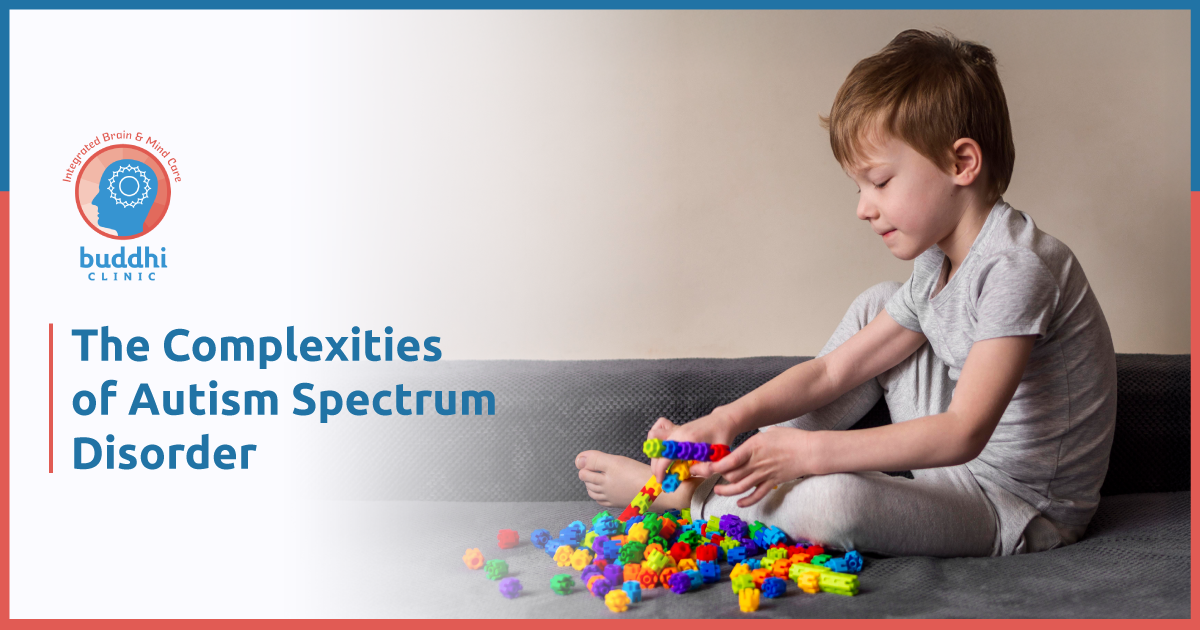Introduction
Complexities of Autism Spectrum Disorder (ASD) is a neurodevelopmental disorder that impacts people differently. The “spectrum” refers to the varying symptoms, skills, and difficulties that a person with ASD can have. Complexities of ASD involve an extensive variety of symptoms, comorbidities, and varying severity levels. The complexities of ASD need to be understood to offer efficient support and interventions for individuals with ASD.
What Is Autism Spectrum Disorder?
Autism Spectrum Disorder (ASD) is a neurodevelopmental disorder that is marked by challenges with social communication and interaction, as well as by limited and repetitive patterns of behaviour, interests, or activities. The signs of ASD are very diverse in severity and in the way they affect daily life. Some people with ASD will have severe intellectual disabilities and need a lot of support, whereas others will have average or superior intelligence and be able to function independently.
The precise aetiology of ASD is not yet known, but it is thought to be caused by a combination of genetic and environmental factors. Several genes have been identified as being linked to ASD, and studies indicate that some environmental factors, including prenatal exposure to toxins or infection, can increase the risk of developing ASD.
Complexities of Autism Spectrum Disorder
The complexities of ASD stem from the broad spectrum of symptoms, co-occurring conditions, and degrees of severity that people with ASD can experience. These complexities must be understood in order to offer effective interventions and support.
1. Broad Spectrum of Symptoms
People with ASD can present with a range of symptoms, such as:
Social Communication Challenges:
Difficulty understanding and utilising verbal and nonverbal communication, trouble with relating to others and maintaining relationships, and minimal eye contact.
Limited and Repetitive Behaviours:
Repetitive speech or actions, insistence on sameness, and excessive interest in particular topics or activities.
Sensory Sensitivities:
Over- or under-sensitivity to sensory input, including lights, sounds, texture, or smells.
2. Co-Occurring Conditions
A majority of those with ASD present with co-occurring conditions that make it difficult to diagnose and treat. Some of the common co-occurring conditions are:
Intellectual Disabilities:
30-40% of those with ASD have intellectual disabilities, which may affect their ability to learn and carry out activities of daily living.
Anxiety Disorders:
Up to 40% of people with ASD present with anxiety disorders, which intensify social and behavioural difficulties.
Attention-Deficit/Hyperactivity Disorder (ADHD):
ADHD occurs frequently in those with ASD and results in challenges with attention, impulsivity, and hyperactivity.
Epilepsy:
Seizure disorders are more common in those with ASD than in the general population.
Gastrointestinal Issues:
Gastrointestinal issues are present in many individuals with ASD, including constipation, diarrhoea, and abdominal pain.
3. Differential Levels of Severity
The level of severity of symptoms of ASD is quite variable between individuals. Diagnostic and Statistical Manual of Mental Disorders (DSM-5) classifies ASD into three severity levels:
Level 1 (Requiring Support):
Individuals could have trouble beginning to initiate or sustain a social interaction and trouble with organization and planning.
Level 2 (Requiring Substantial Support):
Individuals could have serious difficulties with verbal and nonverbal social communication and displaying rigid behaviours.
Level 3 (Very Substantial Support):
Individuals can experience significant communication difficulties and extreme struggle with dealing with change and social interaction.
4. Daily Life
The intricacies of ASD can have a very profound effect on the daily life of an individual, including their capacity for communicating, learning, and social participation.
Early intervention and diagnosis can make a big difference in enhancing outcomes and enabling people to access the support they need to succeed.
Why Choose Buddhi Clinic for Managing the Complexities of Autism Spectrum Disorder?
At Buddhi, we pride ourselves on being a centre for comprehensive brain & mind care throughout all stages of life.
We specialise in the diagnosis, treatment, care and rehabilitation for the gamut of disorders of the brain and mind, blending the best of modern science, the rigour of modern medicine and the richness of ancient healthcare traditions.
WHY US?
- Expert Care You Can Trust
- A Whole-Person Healing Process
- Individualised Care Plans
- Easily Accessible Online Counselling
Choose Buddhi Clinic for a caring, thorough, and individualised approach to treating Autism Spectrum Disorder. Allow us to assist you in making that first step toward a brighter, more balanced future.
Conclusion
Autism Spectrum Disorder is a multifaceted and complex condition that calls for an in-depth examination of its symptoms, co-morbidities, and degrees of severity. Identifying and understanding the complexities surrounding ASD, we can more effectively support and intervene for individuals on the autism spectrum.
Early diagnosis, individualised treatment plans, and regular support are crucial to enabling individuals with ASD to live their best lives.
FAQs
1.Why is Autism Spectrum Disorder caused?
Although the precise cause of ASD has not yet been discovered, the condition is suspected to be due to a complex interaction of genes and environmental issues. There have been various genes linked to ASD identified by scientists, and certain environmental conditions tend to predispose one to having the condition.
2.How is Autism Spectrum Disorder diagnosed?
ASD is diagnosed by a thorough evaluation that involves a detailed medical history, behavioral observations, and developmental screenings. Healthcare providers apply criteria described in the DSM-5 to diagnose ASD.
3.What are the typical symptoms of Autism Spectrum Disorder?
Typical symptoms of ASD include challenges with social interaction and communication, limited and repetitive behaviours, and sensitivities to sensory input. The degree and effect of these symptoms can range greatly from person to person.
4.What are the treatment methods for Autism Spectrum Disorder?
Treatment for ASD involves behavioural therapies, speech and language therapy, occupational therapy, and educational treatments. Medication can be prescribed to treat comorbid conditions like anxiety or ADHD.
5.Can people with Autism Spectrum Disorder lead an independent life?
Most people with ASD can be independent, particularly if they are diagnosed early and given the necessary support. The degree of independence depends on the severity of the symptoms and the presence of comorbidities.






